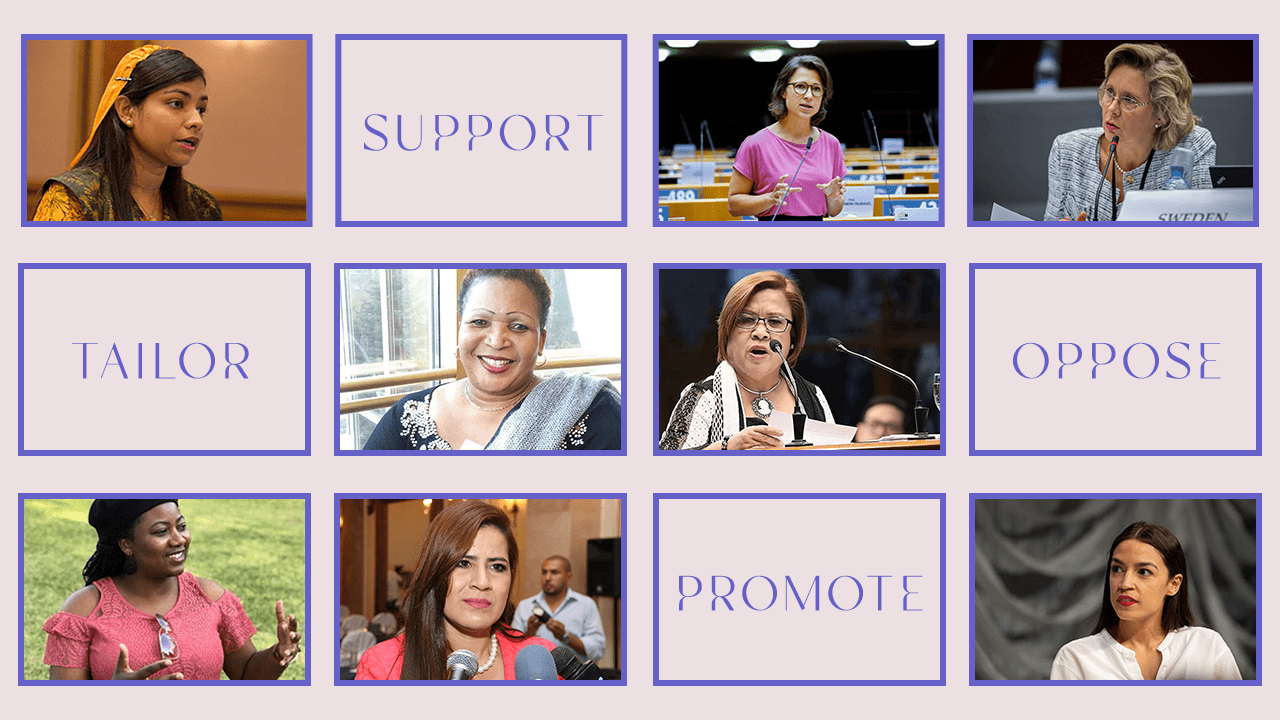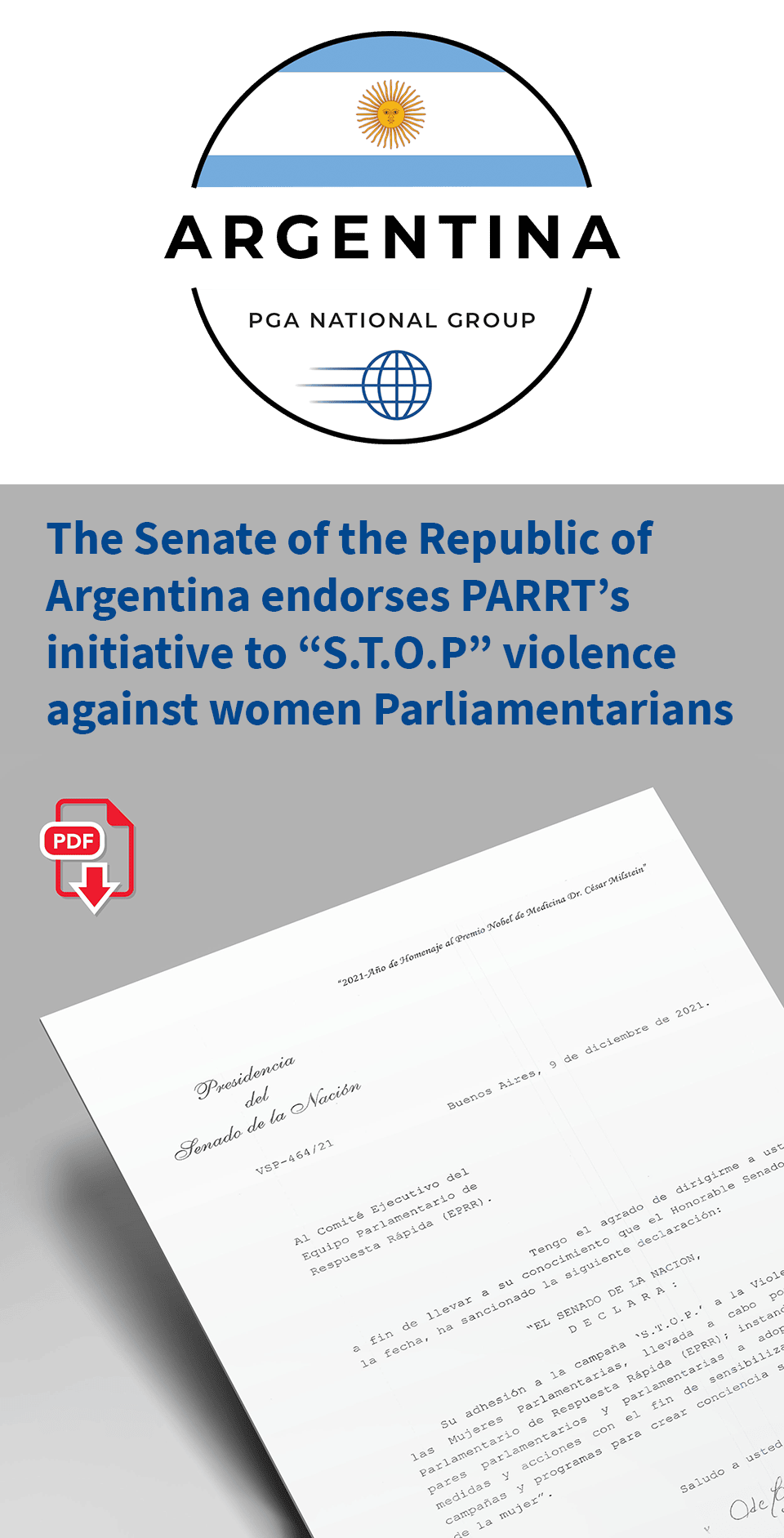
Top row: Rozaina Adam, MP (Maldives); Dr. Hannah Neumann, MEP (Germany) Photo: European Parliament/Daina Le Lardic; Margareta Cederfelt, MP (Sweden); 2nd row: Hon. Dorcas Sibanda, MP (Zimbabwe); Senator Leila de Lima (Philippines); Bottom row: Joana Mamombe, MP (Zimbabwe); Dip. Karina Sosa (El Salvador); Rep. Alexandria Ocasio-Cortez (United States) Photo: Ståle Grut/NRKbeta;
We have seen an increase in serious human rights violations and attacks on our democratic institutions during the Covid-19 pandemic, and, in particular, a worrying surge and aggravated wave of discrimination and political violence against women and the most vulnerable. Today, as Members of Parliament around the globe, we are coming together to denounce the persecution, prosecution, sexism, harassment, and all other forms of discrimination and violence against women parliamentarians around the world. Violence in any of its forms must not be used as a tool to repress women and those who participate in political spaces. Gender imbalance and inequality, and attacks on women, weaken our ability to build stronger democracies and more resilient societies. Dr. Hannah Neumann, MEP (Germany),
Founding Member of Parliamentary Rapid Response Team (PARRT)
According to recent reports, the existence and prevalence of sexism, misogyny, democratic backsliding, and authoritarianism have created fertile ground for the institutionalization of violence against women in politics and human rights defenders. Violence against women in politics can be physical, verbal, sexual, economic; manifesting in abductions, harassment, arbitrary arrests, rape, and public and online attacks (which, in some cases, have escalated into physical aggression and even death). The fight for full participation in political decision-making processes and the promotion of comprehensive women’s rights has come at a great cost to women, particularly to those mobilizing in parliaments and taking the necessary actions to eliminate all forms of violence against them. The pandemic has also served as an excuse, in some cases, for restricting women’s ability to exercise their human right to assemble, especially when they protest against state-led policies which are unfair and violate fundamental rights.
Women politicians worldwide have been victims of these attacks, which in many cases have been carried out with impunity. PGA member Sen. de Lima from the Philippines is a case in point: she is a fiercely outspoken woman and human rights advocate who has publicly condemned her government and consequently been persecuted, maligned, and incarcerated under fabricated charges. On multiple occasions, PGA’s global membership has called on President Duterte’s government to release Sen. de Lima from prison, where she has been detained for over four years. Despite international efforts and condemnation, Sen. de Lima remains arbitrarily deprived of her fundamental right to liberty.
In July 2020, US congresswoman, Alexandria Ocasio-Cortez, was exposed to a sexist slur by the Republican Congressman, Ted Yoho, and publicly admitted that she was a survivor of sexual assault. Asambleísta Soledad Buendía, former chairwoman of PGA’s National Group in Ecuador and human rights defender, still remains in exile after receiving death threats, attacks in the media, political persecution, and serious violations to her own physical and psychological integrity
As a woman and parliamentarian, I cannot feel more identified and related with all these cases where we have seen an absolute abuse of power coming from different political institutions in our countries. Despicable acts of humiliation and intimidation against women in Parliament is particularly what we, as representatives of the people, need to refrain from. There are moral and democratic conducts that we need to abide by regardless of our political differences, and such behaviors not only hinder what we, as women, have achieved in terms of gender equality but also injure the most intrinsic foundations of our democracies and the Rule of Law Hon. Rozaina Adam, MP (Maldives),
Chair, PARRT Founding Member
The Covid-19 pandemic has seemingly sparked additional online violence against women in Parliament through social media and other platforms. In a declaration made early this year, UK legislator, Ms. Maria Miller, admitted that she, as an MP, “had to become accustomed to a regular bombardment of online verbal abuse, including threats of rape and murder.” She noted that hers was not an isolated case, as “[f]emale colleagues across the House are routinely targeted online with abusive, sexist, threatening comments. As Amnesty has shown, black female MPs are most likely to be subjected to unacceptable and even unlawful abuse.” On 9 March 2021, Roberto Carlos Silva, a well-known “YouTuber” in El Salvador and a Nuevas Ideas political party activist, was captured (article available only in Spanish) after harassing and delivering physical threats and expressions of violence against former PGA Board Member, Karina Sosa.
In Belarus, the main opposition presidential campaign held by Ms. Sviatlana Tsikhanouskaya in July 2020, was one of the most significant challenges to the election of Alexander Lukashenko. In this occasion, President Lukashenko deliberately targeted women activists, politicians, and their female family members, while threatening them with gender-specific reprisals, including threats to subject them to acts of sexual violence. According to the International Foundation for Electoral Systems (IFES), “violence against women in elections is a threat to the integrity of the electoral process – it can affect women’s participation as voters, candidates, election officials, activists, and political party leaders, and it undermines the free, fair, and inclusive democratic process.”
Unfortunately, despite slow-paced progress in the promotion of gender equality and equal participation of women in Parliament, these attacks continue with a worrisome trend towards the systematization of discriminatory behaviors.
At the peak of the global pandemic in March 2020, the Zimbabwe Supreme Court ruled that the opposition party Movement for Democratic Change Alliance’s rise to power was irregular. With the Court ruling as justification, the Government removed opposition MPs from Parliament, including PGA Member Hon. Dorcas Sibanda, chair of the PGA Zimbabwe Group.
On 26 April 2021, PGA’s Parliamentary Rapid Response Team (PARRT) received an urgent referral concerning the situation involving torture, sexual abuse, and other serious human rights violations against MDC-Alliance women parliamentarians and activists in Zimbabwe. The case relates to Member of Parliament Hon. Joana Mamombe and opposition activists Cecilia Chimbiri and Netsai Marova, whom, last year, were abducted by the security forces after attending a protest during a Covid-19 lockdown. According to their testimony, the police tortured, sexually assaulted, forced them to drink each other’s urine, and dumped them into a rural area where they were found heavily injured and traumatized. After these events, they were arrested for faking their abduction and placed in pre-trial detention.
This has not been the only case where the three women have been arrested. In March this year, Hon. Mamombe and Ms. Chimbiri were re-arrested on charges of violating Covid-19 containment measures. While in prison, Hon. Mamombe was taken to the hospital as she presented acute stomach pain. However, in spite of her critical health conditions, officers seized her from the hospital without clearance from doctors. Following multiple appearances in Court and requests for bail denied repeatedly, on 5 May 2021, Hon. Mamombe and Ms. Chimbiri were finally released with a $20.000 ZBD bail each, with very strict restrictions.
Democratic backsliding in Zimbabwe has raised the attention of the international community. Last year, the United Nations released a statement calling authorities to prosecute the perpetrators and end abductions, torture, and sexual violence against women while urging a “zero-tolerance” policy for such heinous crimes. On 28 April 2021, the Vice-President of the European Parliament and chair of the PGA European Parliament Group, Mr. Fabio Massimo Castaldo, tabled two critical questions at the European Commission and the European External Action Services (EEAS) to raise awareness of the situation of the Chairwoman of PGA’s National Group in Zimbabwe, Hon. Dorcas Sibanda, and other legislators persecuted and removed from Parliament.
What is happening to my colleagues Joana, Cecilia, and Netsai, is outrageous. The fact that Joana is not allowed to receive proper medical treatment is a clear violation of the Zimbabwean constitution, which establishes under article 50(5)(d) that every prisoner is entitled to conditions of detention consistent with human dignity including medical treatment. Moreover, the disregard of this basic right is a clear violation of international treaties to which our country is part of, namely the International Covenant on Civil and Political Rights, the International Covenant on Economic, Social, and Cultural Rights, the African Charter on Human and Peoples Rights, and the United Nations Convention Against Torture. Since ZANU-PF got into power after the coup d’état in 2017, Zimbabweans have seen how their most fundamentals rights have been curtailed. Democracy has considerably eroded in my country, and the Executive has managed to take control over the Legislature and the Judiciary, violating the separation of powers principle Hon. Dorcas Sibanda, MP (Zimbabwe),
PARRT Founding Member
Women parliamentarians bring skills, different perspectives, structural and cultural differences which contribute to creative problem-solving and effective representation of the people. Attacks against women parliamentarians pose a severe barrier to the development of societies. Women’s active and full participation in decision-making within parliaments, without constraints and fear of repression, is essential to peace, democracy and sustainable development:
Women’s participation not only can result in comprehensive legislative reforms which can tackle violence against them and governmental oversight and monitoring, as it happened in Spain when the Members of the Congress created a sub-committee of the Equality Committee responsible for monitoring the enforcement of the 2004 Organic Act on Integrated Protection Measures Against Gender Violence but also, it can help to put the burden of change and progress on men. In Sweden, Members of Parliament across different parties, have created a Swedish Male Parliamentarian Network which encourages men to engage in public debate about men's values, prejudices, equality amongst all human beings, and most importantly, to point out men’s responsibilities when engaging in violence against women. Ms. Margareta Cederfelt, MP (Sweden),
PGA President
When governments undermine the importance of international conventions protecting women, as it happened with Turkey’s recent withdrawal from the Istanbul Convention and Poland’s move to follow a similar path, we jeopardize women’s enjoyment of basic rights and place the credibility and trust of democratic institutions at risk. We need to remind our peers that democracy pre-supposes genuine participation and partnership between women and men alike. Democracy is not just about elections, political campaigns, and checks and balances. Democracy covers a much wider spectrum that embeds principles of equality and non-discrimination, full enjoyment of human rights, effective participation in public and private spheres, and dignity and inclusion for all.
Democracy’s strength relies on how our institutions represent and are equally and freely accessible to all groups.


